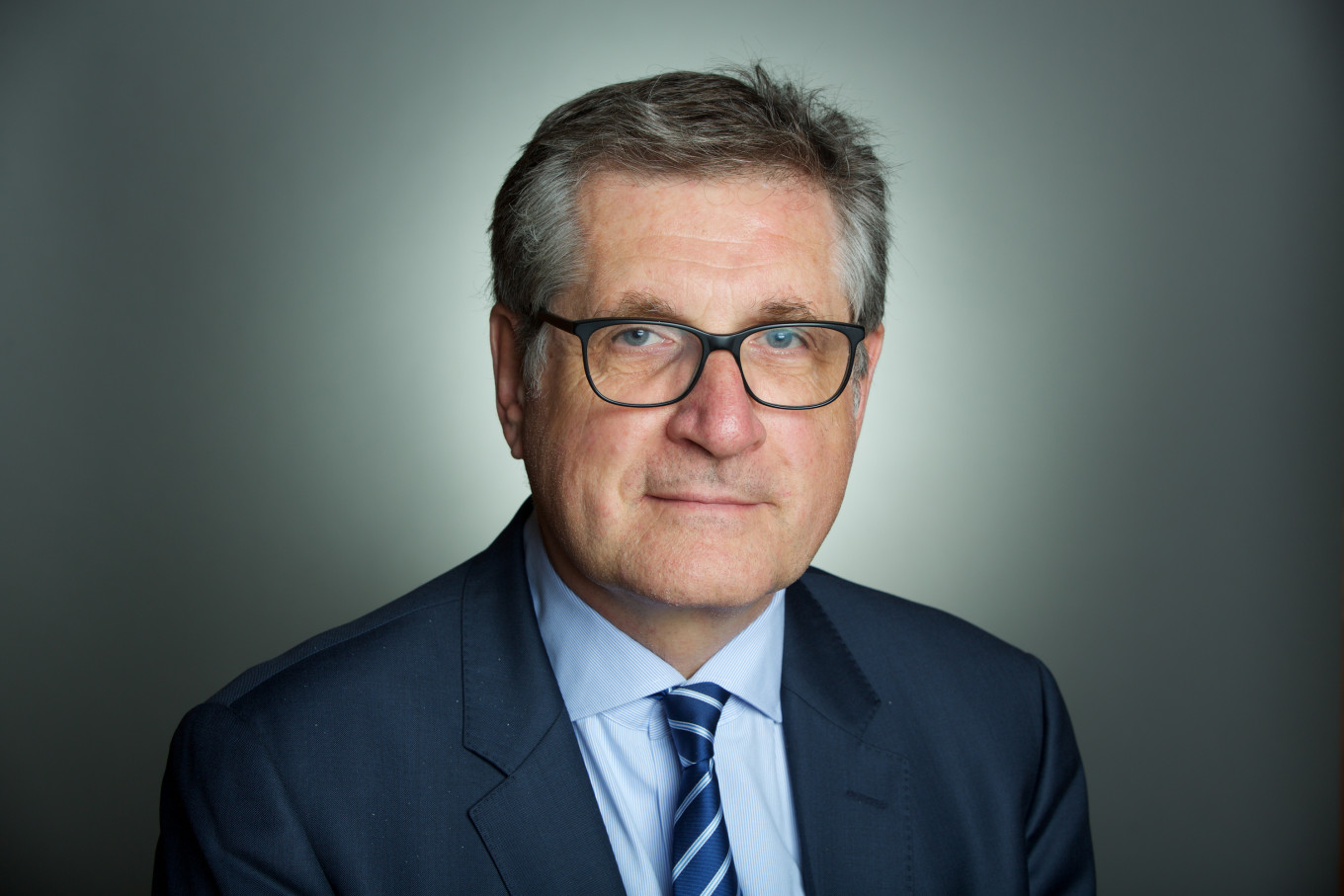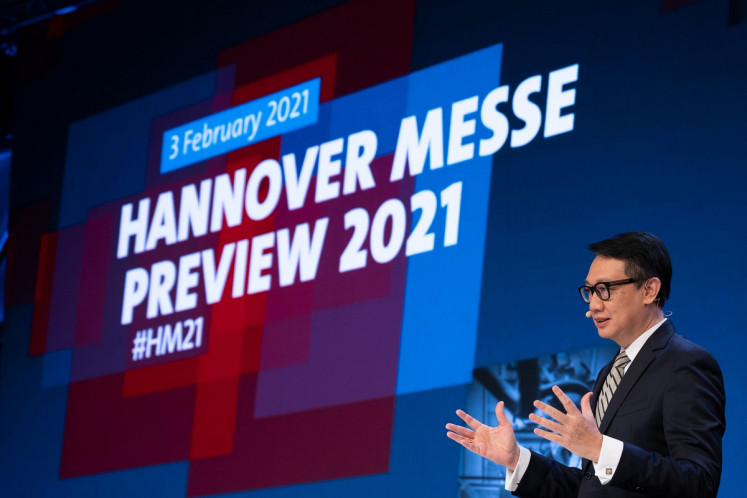Indonesia, Germany support one another against the odds
German Ambassador to Indonesia Peter Schoof is ending his tenure in Jakarta this month. The Jakarta Post’s Dian Septiari sat down with him on Monday to discuss the bilateral relationship, COVID-19 cooperation and the sticky issue of palm oil.
Change text size
Gift Premium Articles
to Anyone

G
erman Ambassador to Indonesia Peter Schoof is ending his tenure in Jakarta this month. The Jakarta Post’s Dian Septiari sat down with him on Monday to discuss the bilateral relationship, COVID-19 cooperation and the sticky issue of palm oil. The following are excerpts from the interview:
Question: What are some of the biggest milestones of the Indonesia-Germany relationship over the past three years?
Answer: Let me start with COVID-19, because I think one of the most memorable and also emotional events as an ambassador was the incredible mutual assistance that we [gave to] each other last spring when we had to take care of our nationals. We flew 2,500 stranded tourists from Bali and Jakarta. That was only possible because we had this fantastic cooperation with the authorities at all levels in Jakarta and Bali and also at the airports, and it was very important that this could be [achieved] so smoothly.
The second thing is the very good cooperation we had at the [United Nations] Security Council. In the two years we were members, I visited the Foreign Ministry very often and my Indonesian colleague at the embassy in Berlin was very often at the Foreign Office. I think we worked together extremely well; we had a co-penholdership [for the situations in] Afghanistan and [...] supported each other in the themes that we wanted to bring into the council.
The third thing is that, against all odds, we managed to organize the Hannover Messe [trade fair] this spring, the first-ever in the digital way. There were a high number of attendees, and there was of course the joint opening [ceremony] by President Joko [“Jokowi”] Widodo and Chancellor Angela Merkel. And our ministers met and we had political and business dialogues. We were sort of postponing the physical fair to 2023, with Indonesia as a partner country, so we’ll have two years now with Indonesia as our [featured] partner.
Are there any concrete follow ups from the Hannover Messe?
We signed a joint declaration on cooperation in the health sector between our two ministers. We have a joint memorandum on what we call the “green infrastructure initiative”. But these are all from the government side. We want to see more coming from the private sector, and this will very much depend on how Indonesia will facilitate future investments here.
We still have many companies that are hesitant to come to Indonesia because they are not sure about the regulatory framework. It will take some time for Indonesia to overcome this image as a difficult partner when it comes to labor laws, for instance. So we are very much welcoming of the Omnibus [Job Creation] Law, which is an incredibly important step, but the proof is in the pudding, and we also want to see in practice a new investment climate.
What about the offer for German companies to invest in industrial areas in Batang, Central Java?
That is just one possibility which has come into discussion, and we find it very interesting to discuss. I think our companies would want to see concretely where the advantages for investments would lie in such a concept. It's a good idea that was practiced in a number of countries, but we have to look at more details.
We have communicated this to our business community, and I think all I can say is that there's great interest, but people are asking questions about the details: “How is it different from the normal investment regime?” or “how much easier is it to hire staff?” We have discussions about the local content, which sometimes comes a little bit in the way of investment, and how much easier it is to just get permits and these kinds of things.

What is the most important issue to address for the future of the Indonesia-Germany bilateral relationship?
Energy and climate change are some of the most important issues. I think my friendly recommendation is to really start thinking about decarbonizing the economy, not only because it's good for the environment, but because it is not the [preferred] business model anymore. I [noted] the decision to have a moratorium on coal fire plants, and I think it is absolutely the right decision.
I could imagine what we can do here about the so-called “dependency” on fossil fuels and coal. I think there are alternatives if you are really willing to look at these things very closely. Because we are also very present in development assistance, with big emphasis and for the future bilateral relationship, I would wish that our two countries put their hands together and work really [hard] on how to learn from each other in the energy transition.
What about concerns in Indonesia about Europe's policies on palm oil?
As we are now speaking about the REDD II directive in the European Union, negotiations are starting. The palm oil legislation is part of a general analysis of the influence of biofuels on the environment. It is formulated along certain criteria of land uses. This is all part of the new legislation that is going to take place where palm oil, soy, rapeseed and other vegetable oils are jointly analyzed. I think the trend in the European Parliament mainly is that the EU is becoming stricter, so the good news is that maybe not only palm oil but also other vegetable oils may be affected.
I only wish that we don’t allow ourselves [to let] our bilateral relations with Indonesia [and] EU relations with Indonesia be dominated so much by this issue. We are different in certain ways. We have a procedure to solve all the differences, which is the WTO [World Trade Organization]. So let's just see [out] the issue [in the forum] where it belongs and solve it. Let's try to engage in a dialogue where we can manage all the differences.
Indonesia and Germany have been very active in supporting the COVAX facility. Going forward, what is the ideal situation for global vaccine distribution?
We have a very ambitious goal, but it is very difficult to achieve and all depends on the financing side.
Secondly, we may need to have a conversation with the pharmaceutical sector about the export restrictions, because some states have insisted that the production and procurement be accompanied by export restrictions, which is not the case in Europe.
The third thing is that we have to really study in detail the whole value chain of vaccine ingredients, because I think that is one of the biggest problems which is easily overlooked – that some parts of a vaccine are produced by some countries. There is a certain production capacity [to be met] to produce molecules that you need to have.
We have to see how we can [improve on] the supply chain for these ingredients to make production go faster. And then comes the problem of how we can also increase the production capacity in the Global South. We need to lay the technical [groundwork] for all these things to happen.
Vaccine patents are one of the limitations that prevent developing countries from increasing production capacity, which is why most of them, including Indonesia, support the proposal for a patent waiver at the WTO. What is your perspective on this?
First of all, in the situation that we are at the moment, the waiver won't do anything; the problem is vaccine production.
It is very important because it is actually an invitation for all research communities in all countries to [link up their] networks in a better way and strengthen cooperation. Because on the one hand, in order to [get to] all these incredible scientific inventions [...] the governments of these countries have [spent] a lot of money to make them possible. There is private capital, of course, but there's a lot of taxpayer money that is going into [vaccine research].
From a business point of view, you take a huge risk. And for these entrepreneurs, they need some intellectual property protection. Now, does that mean we have to monopolize it in the way that we have seen throughout this pandemic? I think with the way that [the COVID-19] pandemic hit us, there was no way to do anything else.
For the future, I think it is important to have a discussion about this, and we will have to sit together at some point to find lessons learned. But let's not forget we're still in the process of [mitigating a] pandemic; we still need to see how the vaccine responds to the Delta variant [of the coronavirus] and maybe there's a new generation of vaccines which will be different from what we have.
The WTO proposal specifically mentions that this is for the current emergency situation. Shouldn’t there be concessions to make?
We now have established vaccines in the market, but now we also have new COVID-19 variants. We ask ourselves, “Are they really sufficient?” And maybe in the production of the vaccines, we have to change certain elements and so on and so forth. How do you want to do all of this when you just waive the patents, and then everybody produces it in a lot of countries, and then you have new variants and you need scientific initiatives to address them? I think it's very difficult.
I think [we need] a much more general way of looking at this instead of [putting it in the context of] this pandemic. I think we're distracting ourselves. Improving supply chains is much more important; we'll save lives to make production go faster.









